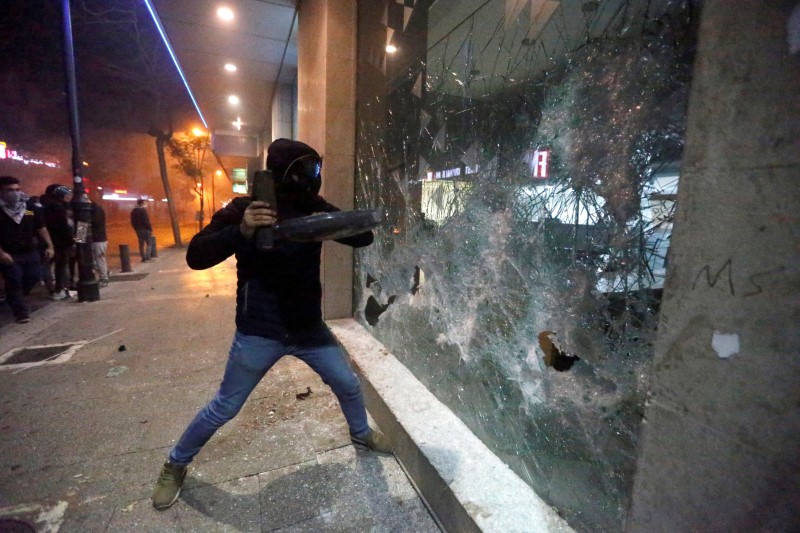By Tom Perry
BEIRUT (Reuters) - Lebanese politicians are watching on as the economy collapses and protests turn angry, a senior U.N. official said on Wednesday, rebuking a ruling elite that has failed to agree a government or rescue plan for a country in deep crisis.
With banks tightly limiting access to cash, lenders were targeted in a night of violent protests in Beirut's Hamra district. Bank facades and ATMs were smashed and dozens of people wounded in confrontations with police.
Heavily indebted Lebanon has struggled since the government was toppled by the resignation of Prime Minister Saad al-Hariri in October as a result of protests against corruption and bad governance that are root causes of the economic problems.
Political rivalries have obstructed a deal on a new cabinet as the crisis hits ordinary people: the Lebanese pound has lost around a half of its value while anger at banking controls have led to rows and violence in branches.
"Another day of confusion around the formation of a government, amidst the increasingly angry protests and free-falling economy," Jan Kubis, U.N. special coordinator for Lebanon, wrote on Twitter. "Politicians, don't blame the people, blame yourselves for this dangerous chaos."
Kubis appeared to credit central bank governor Riad Salameh, saying he had sought "extraordinary powers to at least somehow manage the economy while those responsible watch it collapsing".
"Incredible," he wrote.
Salameh asked for extra powers last week, saying he wanted to standardize the banking controls.
Looking to assure anxious depositors, parliament speaker Nabih Berri said work was underway to safeguard people's money, especially small depositors and those of expatriates, without specifying further.
"BEGGING" IN THE BANK
The long-brewing economic crisis snowballed last year as hard currency inflows slowed down, leading to a shortage of dollars needed to finance the state's deficit and import needs.
The violence in Beirut's Hamra area was some of the worst since anti-government protests began in October. Security forces fired tear gas outside the central bank to disperse protesters who pelted them with stones and fireworks.
One man hurled a car battery at the glass facade of a bank as another hit it with a metal pole, Reuters TV footage showed. On Wednesday morning, glass was being swept up at one vandalized bank as workers tried to fix a broken ATM at another.
A woman on Hamra street who gave her name as Hind said she supported protests against banks. "I have been coming here for the last three days and only could take $300 ... we are begging, working 55 years to come and beg at the end," she told Reuters.
"I was expecting what happened yesterday. Unfortunately the chaos is because of the politicians," said Hamra shopkeeper Mohammad al-Rayyes.
The banking association condemned the attacks as the work of a "mercenary mob" and not the "real revolutionaries of Lebanon" seeking reform. It condemned the "severe and irresponsible tardiness in forming a new government", saying this made it look like banks were responsible for deteriorating conditions.
The powerful Iranian-backed group Hezbollah and its political allies last month nominated Hassan Diab, a little-known former minister, to form a new government after the failure of efforts to forge a deal with Hariri, a traditional ally of the West and Gulf Arab states.
